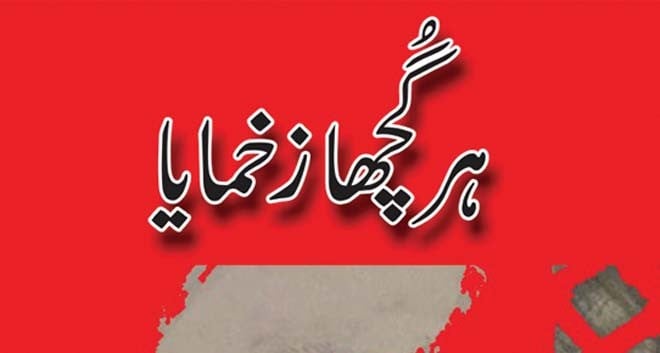
Neelum Ahmad Basheer’s range of subjects never exhausts in her new book of Punjabi short stories and connects us with the contemporary society

Senior journalists like I.A. Rehman still cherish the memory of Ahmad Bashir for standing up against Zia-ul-Haq’s dark policies and fighting for freedom of expression and democratic rights throughout his life. Ahmad Bashir, along with other stalwarts like Nisar Osmani, Husain Naqi and Safdar Mir, was repeatedly banned during Zia’s martial law. But instead of giving up, he would start writing again using pen names, for example Shah Hussain, Bullah Shah or Ahmad Khan Kharal, and readers would immediately recognise him.
In addition to being a committed leftist and progressive columnist, he was also a great propagandist and very vocal for the promotion of Punjabi language and literature. Being an excellent talker, he could mesmerise people for hours with his lively way of talking.
Though a very famous writer of Urdu, Bashir couldn’t write anything in Punjabi. This was later going to be achieved by his daughter, Neelum Ahmad Basheer, who is an established Urdu writer. Having half a dozen books of short stories and some travelogues under her belt, her Urdu novel Taoos Faqat Rung has been greatly admired by the literati. She has recently published her first book of Punjabi short stories titled Her Guchha Zakhmaia.
Ina brief introduction of the book, Neelum writes: "writing of this book was due for the longest time. Being a Punjabi, I believe it was my duty to write in my mother tongue, rather in my ‘father tongue’ because he would’ve expected that from me. This book is a token of love for my father and his devotion to Punjabi".
There was a time when just a handful of Punjabi fiction were being written. It is surprising to know that only seven or eight books of Punjabi stories were published during 1960 and 1970, the decades when Punjabi was finally gaining a stronghold after the suffering and bloodshed that Punjab saw during the partition of Pakistan and India. Last year, more than 10 books of Punjabi fiction were published, which included works from senior writers like Nasir Baluch, Nain Sukh, Mudassar Bashir, as well as from some young writers like Ijaz. Though there is a dearth of experiments and most writers are not willing to leave the much-trodden path of realism, Neelum’s book is a valuable addition in modern Punjabi fiction.
Neelum’s range of subjects never exhausts and attempts to connect us with the contemporary society in our country. In one of her stories ‘Painda’ (walk), the narrator of the story is seemingly irritated by a retired major for ‘deliberately invading her space’ during her early morning walks. But the major mysteriously disappears for a few days, and she later gets to know that he has died. She is now caught up in a dilemma as to whether or not she should console his wife. The story sarcastically mocks the urban neighbourhood, exposing our callousness and indifference towards other lives.
There are two stories about young love and the conjugal relation between a husband and wife. ‘Ijazat’ (permission) tells the story of two young people and gives a peep into their platonic relationship. However, the most powerful story of conjugal love is ‘Pehli kinnre’ (the first rain). The story explores the sexuality of women, and men’s total ignorance of their pleasure. ‘In rains, forest takes a bath happily but a part of it never receives rain. The smoke continues to rise slowly from the candle. Her body is like furniture that remains covered with a white sheet.’ The husband wants his wife to act like the western women that he watches in movies and taunts her of being cold. He fails to understand that it is ultimately the strength of their relationship which stirs the woman.
Another powerful story is ‘Hnair’ which is about an aged person called Malik Sahib whose wife dies and he decides to marry his maid who is quite young, however, the children of Malik Sahib ensure that the new wife does not inherit any property. So much so, that her stepdaughter takes her to a doctor for an operation that would eventually leaves her barren. The new wife, however, starts visiting shrines, peers and quacks and though she knows that she wont have a child ever, she doesn’t lose hope.
Two other stories ‘Gulabun wali galli’ and ‘Maan’ are also very powerful. The language in the book -- which is a translation of Neelum Basheer’s Urdu stories -- is simple and direct; and it is actually the quality of her stories that makes the book worth reading. The book is a good addition to Punjabi fiction and enlarges its canvass.
‘Her Guchha Zkhmaia’ (Punjabi short stories) Author: Neelum Ahmad Bashir Publishers: Punjab institute of Language Pages: 128 Price: Rs200